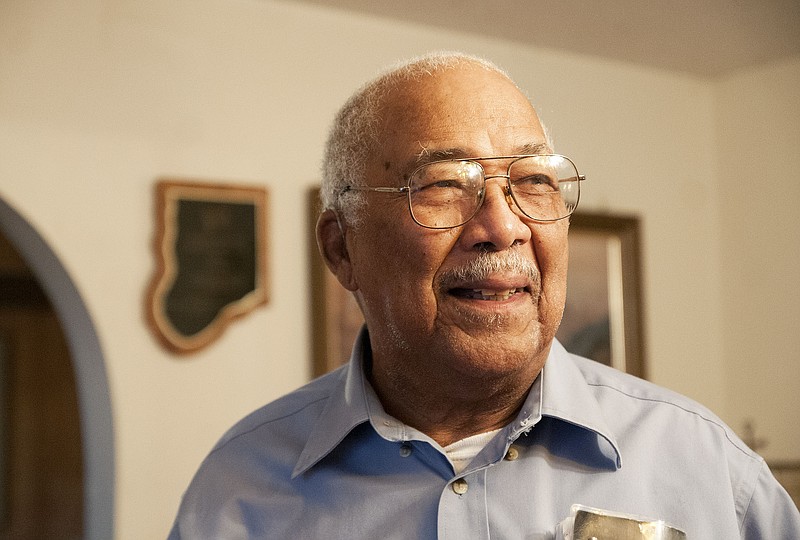Fulton native Jack McBride's most vivid memory from his time serving with the U.S. Navy in the Pacific during World War II involves boxing and a surprise visit from some Japanese planes.
"On Easter Sunday, 1945, ... all of us thought we wouldn't have to do anything that day - they said we could have a boxing match," said McBride, who noted he was his ship's boxing champion. "We were boxing in the ring, and all at once the call went out, "All hands, man your battle stations.'"
McBride said he hurried to his spot - on the hot-shell crew of the 5-inch gun - struggling to get his boxing gloves off along the way.
"One plane came in from the south, and all our gun stations turned on that side, and then a number of planes hit from the north," he recalled, noting his ship shot down one of the planes that day. "The Japanese dropped a lot of tin foil. That was quite a time. Quite a fight there."
McBride served from 1945-47 after being drafted and given the choice of joining the Navy or the Army.
"I had seen several black men who were in the Army, and they talked about the problems they had," he said.
Although he said he would choose the Navy again today, McBride said he had his fair of struggle with that choice too - especially after electing to go into the seamen's branch rather than the steward's branch.
"That was tough for me, for any black in the seamen's branch," McBride said. "It was so segregated - everything was segregated. I had problems because I would speak out. We were upset all the time, but we made it."
McBride's initial welcome aboard his ship - the USS Mountrail, an attack transport - wasn't precisely warm either.
McBride had arrived a day late after taking a side trip home to Fulton, and the officer he presented himself to was less than pleased with the arrival of the first black seaman on his ship.
"This guy was hateful - he didn't give me a bunk number or anything," McBride said. "I stayed there three days and nobody came to me at all. It was just amazing what I had to go through."
McBride said he finally went to the officer of the deck, who got him his bunk and duty assignments.
"My job was like a storekeeper," McBride said. "One of the things I had to do was make sure all the crew members had supplies. When we would come back to the states, I would have to go purchase supplies."
McBride said most of his service was in the Philippines and the China Sea.
"We took troops into the islands where the Japanese were. They'd get off on Higgins Boats, we would back out and wait to go pick up the dead and wounded," he said. "We were busy all the time."
The Mountrail was in the South China Sea when the war ended. McBride said they were sent to Japan, "because they said there were problems we had to work out with Japan."
He said there was a group of Japanese waiting on the dock for the ship when it arrived and "we thought there would be a fight."
"One of our officers walked over to them, and you know what happened? He asked our officer if we had any Camel cigarettes we could give them," McBride said. "We were flabbergasted."
After the war, the Mountrail's job was to go back and forth from the U.S. and the Pacific, bringing troops home.
When McBride got out of the Navy in January 1947, he returned home and got a job at the Harbison-Walker plant, saving up money to buy a house. After Harbison Walker, he took a job with Fulton Public Schools as a custodian at Brown School, with a side job of hauling food to the schools from Jefferson City.
Deciding he didn't want to be a janitor all his life, McBride enrolled in the farm agriculture school at the high school - the first black man to do so in Fulton.
McBride said the first day was a little tense when he walked into the classroom - "I could see some guys didn't like it at all" - but a gesture from two of his classmates during the first break helped to make him feel more welcome.
"Bob Brett and J.W. Bush said, "Come on, let's get a cup of coffee,'" McBride said. "You'll never know how that made me feel. I don't drink coffee, but I bought a cup that day."
McBride went on to buy his own farm, and also worked for the state in the manpower program.
Dealing with - and battling - prejudice is something McBride has become known for in the Fulton and Callaway County.
McBride joined the local chapter of the NAACP in the 1960s and has served as its president since 1978. He said things have improved over those years.
"We don't have to fight some of the fights we did then," McBride said. "Sure, there are problems, but nothing we can't get corrected."

